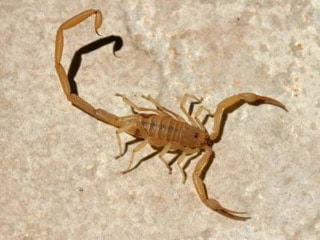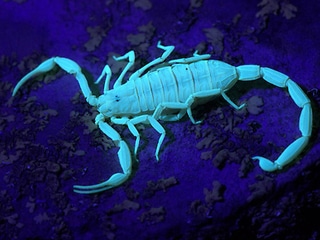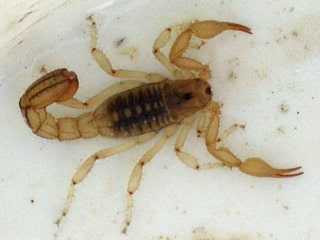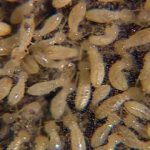Arizona Bark Scorpion

The Arizona bark scorpion is a small species of venomous scorpion commonly found in the Arizona desert – and unfortunately throughout the Phoenix metro area.
Arizona bark scorpions are small at just 1-3 inches in length. They are slender in shape with a long and thin tail, and have a distinct pale yellow color. Although usually discovered sitting completely still, they can move surprisingly quickly when startled or threatened.
Bark scorpions can be difficult to spot due to their coloration, and the fact that they typically hang out on walls, trees, rocks and house exteriors that tend to be very similar in color to their bodies. However, scorpions glow strongly under blacklights, which can be used to spot them at night.
Arizona bark scorpions are nocturnal, and are usually found hiding during the day under stones, in cracks and crags, or commonly under and around tree bark – where they get their name.

Arizona bark scorpions enter homes seeking shelter, water, and food – other small insects. Entries usually occur during the evening, through doors and other large openings.
Unlike most pests, Arizona bark scorpions are quite venomous – the most venomous scorpion species in North America – and extreme caution should be used if encountered.
Although not considered lethal (no deaths have been reported in the past 20+ years), Arizona bark scorpion stings can produce severe pain and swelling at the location of the sting, numbness, frothing/foaming at the mouth, breathing difficulties, muscle twitching and spasms, and even convulsions. If stung, seek immediate emergency medical attention at your nearest hospital.
Southern Devil Scorpion: Bark Scorpion Imposter

The devil scorpion is a larger species of scorpion, closely related to its more dangerous cousin the Arizona bark scorpion, which it closely resembles, and are often incorrectly mistaken for.
It is differentiated from the Arizona bark scorpion by its much thicker tail, which also have noticeable brown strips on them.
Devil scorpions also tend to be significantly larger than other scorpions, including Arizona bark scorpions, which they feed on.
Like all scorpions, devil scorpions are venomous, but are far less harmful than their relative, the Arizona bark scorpion. They are not considered dangerous, and stings are not medically significant, usually only producing mild discomfort.






